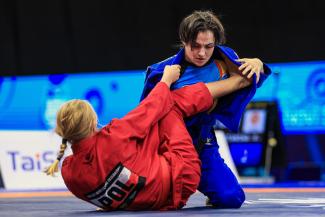Important Updates for Ranking Series, Olympic Qualification Events
Friday, September 6, 2019 - 13:06 By United World Wrestling Press

CORSIER-SUR-VEVEY, Switzerland (September 6) – The Technical Commission of United World Wrestling has approved new regulations for the 2020 Ranking Series events and seeding for Olympic qualification events. The commission has also provided guidance on the calendar for Ranking Series events in 2021-2023.
The first of the 2020 Ranking Series events will be at the end of January and the second will be the first week of June. All three styles will be competed at the same event (as will be the norm in 2021 and beyond). The points earned will be considered when determining the seeds at the 2020 Olympic Games in Tokyo.
To ensure that the best remaining wrestlers qualify for the 2020 Olympic Games in Tokyo, the Olympic qualification events will include seeds for the top two wrestlers in each category. Athletes from nations who are not qualified for the Olympic Games may earn points at the following events:
- 2019 Senior World Championships
- 2020 Senior Continental Championships
- 2020 1st Ranking Series Event
Should there be a tie among wrestlers at the continental and Last Chance event the seeding criteria will be:
- Rank in the 2019 Senior World Championships (in the concerned weight category)
- Rank in the 2020 Senior Continental Championships (in the concerned weight category)
- The number of events (in the three events mentioned above) in which the athletes competed (in the concerned weight category).
- If still a tie, then a seed will be allocated via a number from the UWW Official Draw Device with the lower number earning the seed position.
Please note that an athlete must have at least two ranking points to be eligible for a seed position.

The Technical Commission also approved general guidance for the 2021-2023 Ranking Series. Moving forward, Ranking Series events will be held at the same time and in the same location year-to -- they will also include all three styles of wrestling. In order to ensure geographical equity, it was determined that one Pan-American and one Asian country should host a Ranking Series event, with the other two slated for European destinations.
The general calendar guidelines are as follows:
- 1st Ranking Series (Beginning of February)
- 2nd Ranking Series (End of February)
- 3rd Ranking Series (June)
- 4th Ranking Series (July. Or August when the Worlds are organized in October)
Locations will be voted on by the bureau in the coming months. National Federations interested in hosting a Ranking Series event are encouraged to contact the Sport Department.


Share your thoughts.
Comments